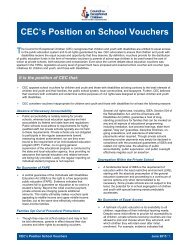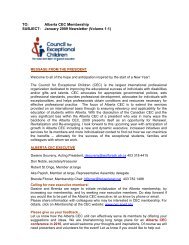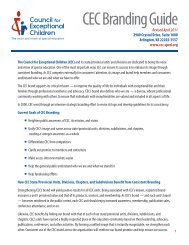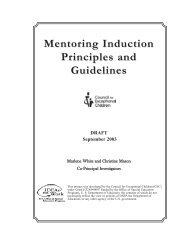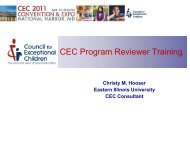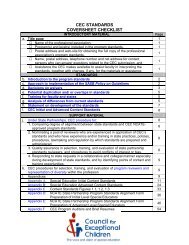What Every Must Know Special Educator - Council for Exceptional ...
What Every Must Know Special Educator - Council for Exceptional ...
What Every Must Know Special Educator - Council for Exceptional ...
Create successful ePaper yourself
Turn your PDF publications into a flip-book with our unique Google optimized e-Paper software.
their lives. A particular commitment should be made<br />
to initiate home care training programs <strong>for</strong> parents<br />
of infants with special needs, to establish specialized<br />
early childhood and kindergarten programs, and to<br />
utilize specialized components of regular early education<br />
programs to serve children with exceptionalities.<br />
Paragraph 9 - Services to Children with<br />
<strong>Exceptional</strong>ities Ages Birth Through Five<br />
The provision of services to children with exceptionalities<br />
from birth through 5 years of age must be made<br />
a priority. It is the premise of The <strong>Council</strong> that lack<br />
of such services currently represents the most serious<br />
impediment to the development of children with<br />
exceptionalities. There is mounting evidence of the effectiveness<br />
of programs <strong>for</strong> very young children with<br />
exceptionalities and their families.<br />
Services to young children with exceptionalities are<br />
presently provided by a variety of systems at national,<br />
state, provincial, and local levels. There is little systematic<br />
coordination between agencies, and major service<br />
gaps remain unfilled. A national initiative is needed to<br />
establish plans <strong>for</strong> systematic coordination among the<br />
social, educational, and health agencies currently serving<br />
children with exceptionalities from birth through<br />
5 years so as to ensure maximum benefits <strong>for</strong> these<br />
children and their families, and to plan <strong>for</strong> the future<br />
provision of additional programs to fill major gaps in<br />
service to this population.<br />
Wide variations in service arrangements are necessary<br />
to meet the individual needs of children. The<br />
<strong>Council</strong> strongly supports the principle that services<br />
<strong>for</strong> young children with exceptionalities, whenever<br />
appropriate, be provided in a context which includes<br />
children without exceptionalities. Effective integrated<br />
experiences can further the development of children<br />
with exceptionalities and also can <strong>for</strong>m the roots of respect<br />
<strong>for</strong> diversity in all children. Since the success of<br />
integrated programs relies heavily on the provision of<br />
specialized teacher training and supportive resources,<br />
the importance of such supports should be reflected in<br />
legislative and funding directives.<br />
In expanding services <strong>for</strong> children with exceptionalities<br />
from birth through 5 years, it is essential that the<br />
central role of the parent in the young child’s development<br />
be recognized. Programs must be designed to<br />
incorporate parental participation and to provide support<br />
<strong>for</strong> families in their role as the child’s primary care<br />
provider. The training of teachers of young children<br />
with exceptionalities should be expanded to include<br />
skills in working with parents in mutually helpful<br />
ways so that parental and agency ef<strong>for</strong>ts in helping the<br />
child are strengthened.<br />
250 whAt every SpeCiAl eduCAtor muSt <strong>Know</strong><br />
Paragraph 10 - Responsibilities<br />
<strong>for</strong> Providing Continuing Education<br />
Services to <strong>Exceptional</strong> Youth<br />
The <strong>Council</strong> believes that education is a lifelong process<br />
and that, instead of age, competency and maximal<br />
development should be the terminating factor with<br />
regard to <strong>for</strong>mal schooling. It also believes that individuals<br />
with learning problems, particularly exceptional<br />
youth, frequently need education and periodic<br />
reeducation beyond the traditional school attendance<br />
ages to encourage their continuing development.<br />
These options might include postsecondary education,<br />
vocational education, job training, employment<br />
counseling, community living skills, and placement<br />
services in order to maximize their ability to contribute<br />
to society.<br />
Paragraph11 - Migrant <strong>Exceptional</strong> Students<br />
<strong>Exceptional</strong> students who are mobile, due to their<br />
parents’ migrant employment, experience reduced opportunities<br />
<strong>for</strong> an appropriate education and a reduced<br />
likelihood of completing their education. Child-find<br />
and identification policies and practices, designed <strong>for</strong> a<br />
stationary population, are inadequate <strong>for</strong> children who<br />
move frequently. Incomplete, delayed, or inadequate<br />
transfer of records seriously impedes educational<br />
continuity. Interstate/provincial differences in special<br />
education eligibility requirements, programs and<br />
resources, minimum competency testing, and graduation<br />
requirements result in repetition of processing<br />
<strong>for</strong>malities, gaps in instruction, delays in the resumption<br />
of services, an inability to accumulate credits <strong>for</strong><br />
graduation, and other serious inequities. In addition<br />
to the disruption of learning, mobility disrupts health<br />
care, training, teacher-student rapport, and personal<br />
relationships.<br />
The <strong>Council</strong> believes that educational policies and<br />
practices should be developed at federal, state/provincial,<br />
and local levels to improve access to education<br />
<strong>for</strong> migrant children and youth with exceptionalities.<br />
These policies should include:<br />
a. A national system <strong>for</strong> the maintenance and<br />
transferal of special education records <strong>for</strong> migrant<br />
students with exceptionalities.<br />
b. Intrastate/provincial and interstate/provincial<br />
cooperation in the transfer of records and of<br />
credits.<br />
c. Flexibility in high school credit accumulation <strong>for</strong><br />
migrant students with exceptionalities.




